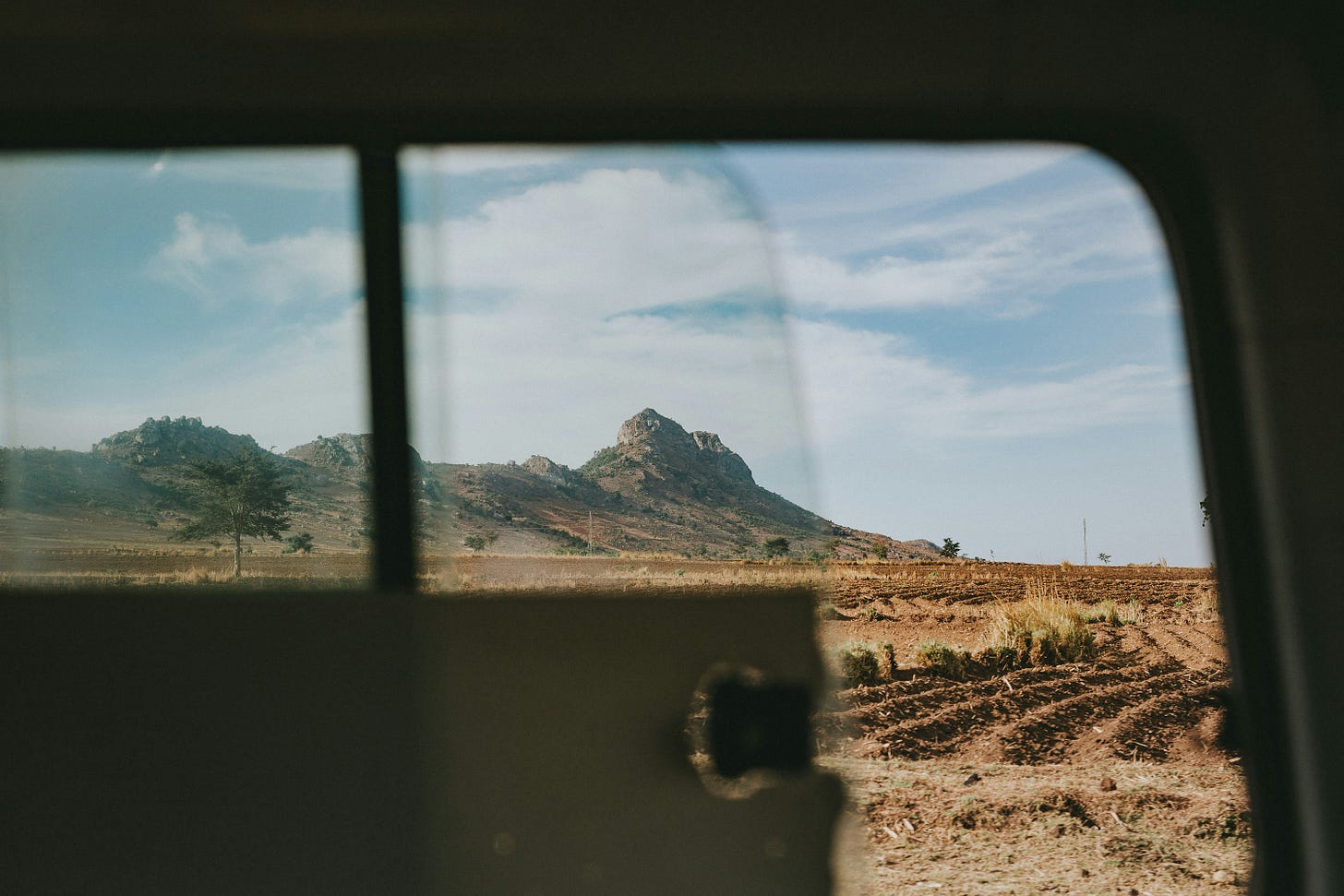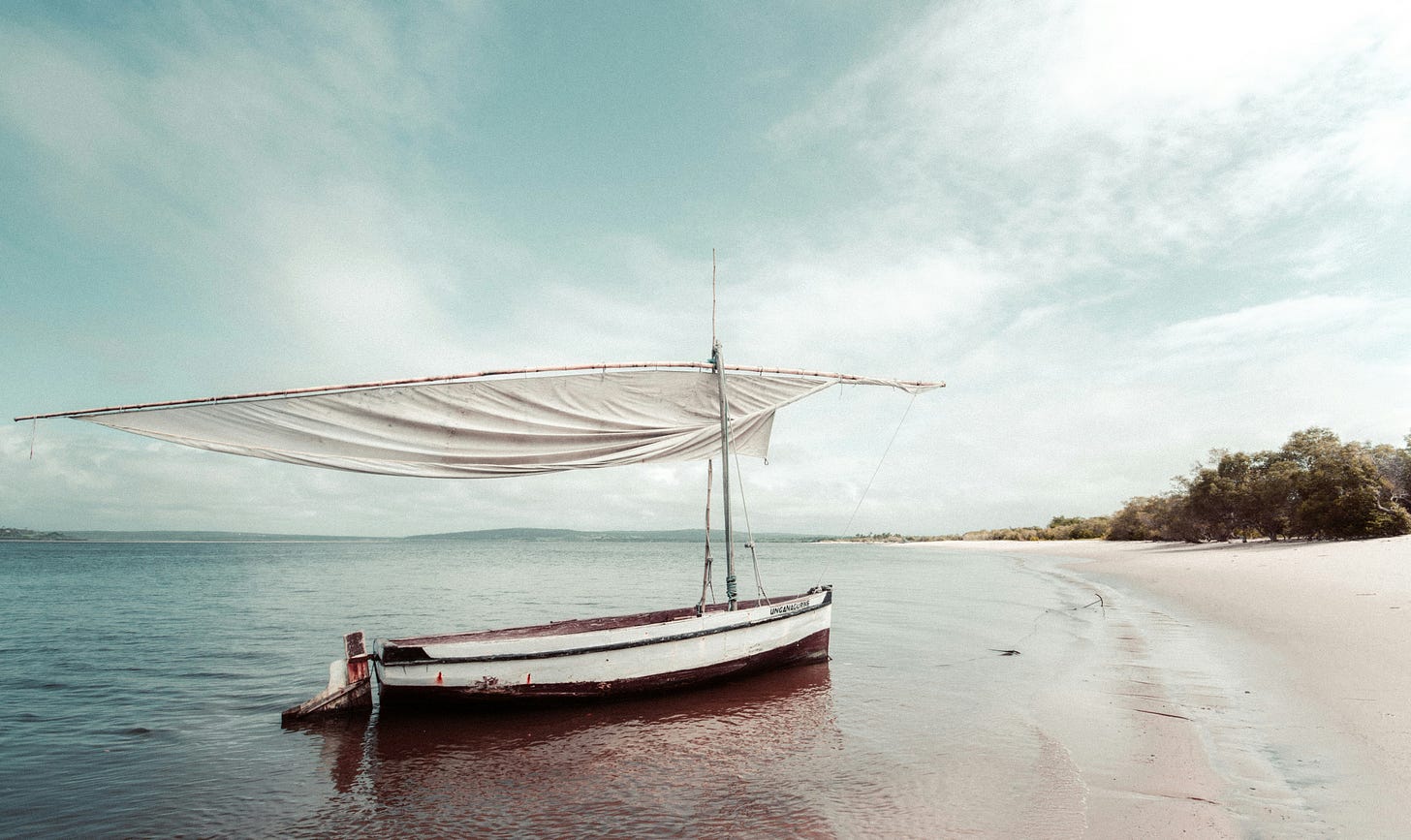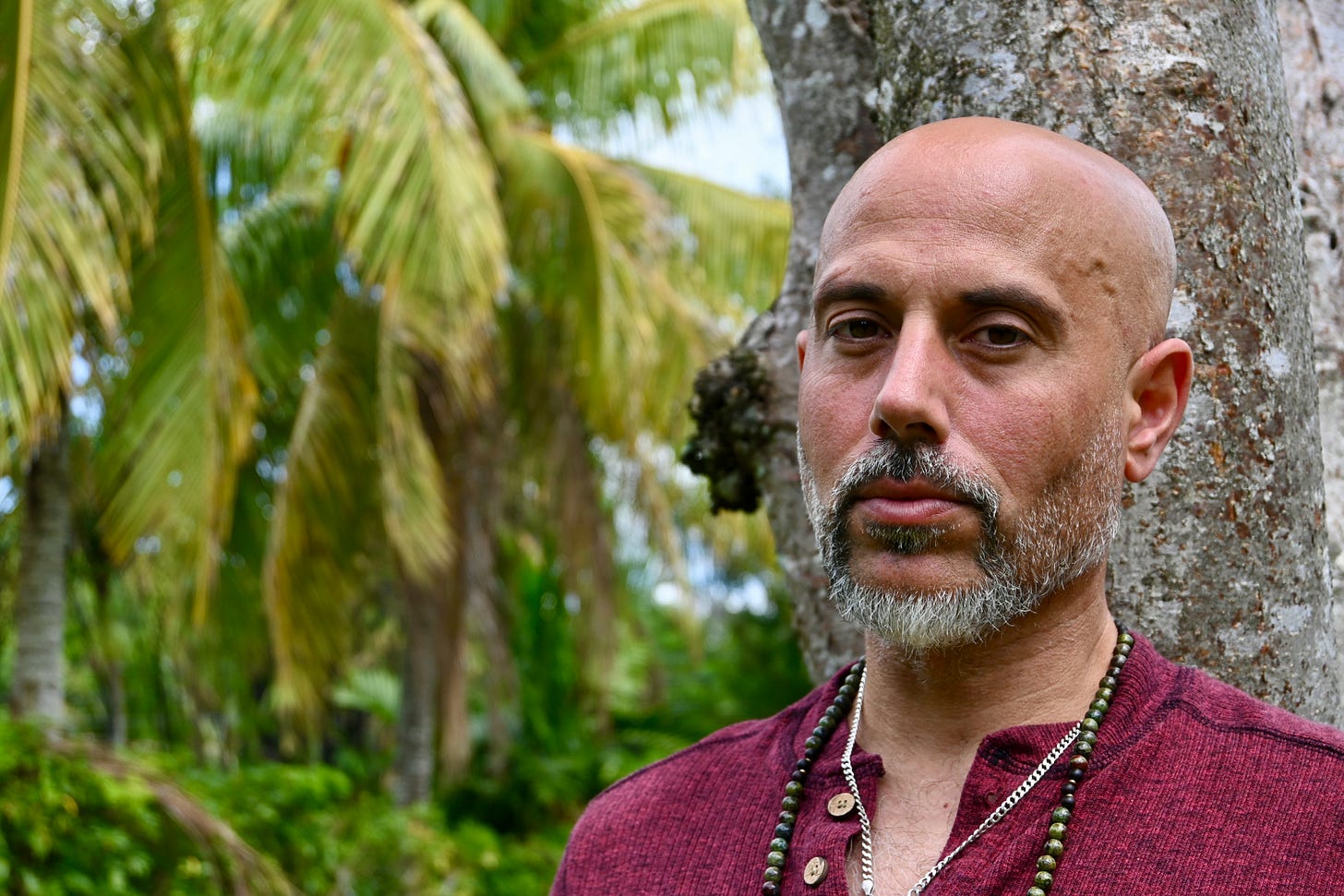Mozambique
An Essay by Theodore Richards
“Mozambique, 1998” is an excerpt from What Happened to Icarus: Encountering the Unfathomable in a World in Crisis (Wayfarer Books, March 2026)
It is likely that most of the mountain people of the borderland area between Zimbabwe and Mozambique have never seen the sea. The thing is, it really isn’t that far. That’s the privilege I have: I can cross borders, travel distances that may have taken generations for my ancestors. Or at least would only have been traversed in one direction—a migrant is a very different thing from a tourist. I’m not exactly a tourist. I’ve been an aid worker; I’ve been living in the “bush”. Now I am headed to the beach.
“What is your question?” says the man on the back of the flatbed truck as he gives me a guava. It is an odd turn of phrase; perhaps his English is not so good and he means something else. After all, even on the other side of the border, the English-speaking side, most do not speak much English. Here, on the Mozambican side, I figure most speak Portuguese, perhaps Shona and some other African languages, but not English.
“What do you mean?” I ask, squinting into the wind and sun as we race down from the mountains into the flatlands.
His English is good. “You are coming a long way,” he says, passing me another guava. I feel like he doesn’t merely refer to the distance from the border to the sea. “You do not look like a business man or a refugee. You must be trying to answer some question.”
I bite into the guava and toss the skin off the truck and onto the high grass that borders the sorry road. I taste its sensuous dance of sweet and sour, the texture of its crunchy seeds and soft flesh. There are other tastes and textures, too, and I taste them: wind blowing through my long hair, the smell of burning garbage, the joy of the road. I am alive. The answer to his question is there—or, rather, the question—but I cannot articulate it. We smile at each other, sharing the fruit of the poorest country in the world, racing through the bush, to the sea, saying nothing.
I arrive in Beira to expectant smiles. This is the poorest country on Earth, not very far removed from a disastrous civil war that stretched out beyond years and into generations. I am grabbed quickly by a smiling cabby. “Where do you go?”
“Bique’s.”
“Ah yes,” he says, smiling broadly. “I know this place. This is a good place.”
He shoves me into the backseat of a dilapidated old car and says something incomprehensible to the driver. Apparently, in Mozambique, driving a taxi is a two-person job. Before he even gets in the car, his partner starts the engine. It sputters weakly. He shouts something again and begins to push, the door still open. Again, the engine sputters. Finally, it starts, and before it takes off, the man leaps into the front seat of the slowly accelerating car. None of this particularly surprises me; I’ve watched, for many months, the acrobatics of bus conductors as they sing their destination and jump in and out of their moving buses. We are off.
We leave the area of the Beira bus station and head north, through the kind of scenery one might expect near the sea: tall grass waving in the salty breeze, palm trees. For a moment, I wonder if the men will actually take me to my destination, if this won’t be some sort of robbery attempt. I’ve been robbed a couple of times before. But it is a brief moment of uncertainty. I am young. And, you see, the risk is worth it. I am answering my question, that unarticulated and unknown question that I can, at that moment, only could be answered in Beira, Mozambique.
Finally, we reach the place. I thank the men and give them a wad of Metacais—worth only pennies but enough that they seem pleased. I enter an incredibly modern-looking bar, equipped with satellite television and a view of the beach. For a few dollars I can pitch my tent on the beach next to the bar; I can use their bathrooms and drink their liquor and cappuccino. White sands stretch out across a vast and empty and clean beach dotted with fishermen and boys playing soccer. An occasional shipwreck. The ocean shines in a bright blue against a slightly lighter and cloudless sky. The World Cup plays on the satellite television: Zidane is working his magic for a French team filled with Africans. Here, in the poorest country in the world, I have found paradise.
As the days pass, a few friends, fellow aid workers, join me in Beira. This is a different time: we’ve communicated through letters, vague addresses scratched on pieces of paper. But they’ve found me.
We spend our days on the beach and wandering through the old town. The streets, twisted and nameless, are at once splendorous in their colonial architecture and desperate in their poverty. We enter an old theater that has been converted into a restaurant; on market days we buy cashews from old Indian women as the men sip coffee in the square; squatters have moved into a luxurious old hotel and grow fruit trees on the roof.
I jog along the beach each morning, passing by the occasional shipwreck along with boys playing football—future Zidanes or, perhaps, Eusebios—and the fishermen pushing their boats out to sea. The port, too, is filled with shipwrecks, “Welcome to Atlantic City” scrawled on the side of one.
***
I return to the sea and watch, eating coconuts and swimming in the ocean. The waves offer themselves to me—even in the darkness of night, I listen to them. Each wave is different, unique; each returns to the same sea. This, I can see, can hear, can feel, is the rhythm of life.
In the evenings a few locals come to the beach bar to watch the world cup, but mostly there are other travelers—white Zimbabweans and South Africans, plus a few aid workers like me. After living in the bush for so long, I enjoy watching Zidane and drinking espresso.
There is an inkling of something happening that we’ve only begun to understand. Globalization and Global Warming are words we’ve heard a lot of in the 1990s, but I don’t really understand what they mean yet, don’t understand the perilous and shrinking world in which we all live.
There is also something awakening in me. I’ve gotten a taste of the backpacker scene as a college student in Spain and in the hostels in Harare. I want to go. I want to go and not stop. To feel the sensation of the wind in my hair as in that flatbed. I am in Mozambique, at the edge of the world. Whatever my question was, I can only ask it here.
The problem is that, in a shrinking world, there are so few edges. Only centers. No questions. Only answers.
As the days pass, my aid-worker friends leave. I am there alone again—eating coconuts and watching the sea. On my last night there, I emerge from the bar to find that it is raining. It has been the dry season; and it has been so long since I’ve seen even a rain cloud that I haven’t even considered the possibility. My ragged little tent, which I’ve borrowed from a friend and had no rain flap, is filling with water.
The bar is now closed, so I try to sleep in the wet tent. Rain drips through the top of the tent, onto my things, onto my head, into my hands—rain, that will return to the sea and be no different than the pulsating waves, the wetness of my own tears. I quickly give up and retreat with whatever dry possessions I can gather into the only dry place I can find—the bathroom.
As bathrooms go—particularly bathrooms in impoverished, war-ravaged countries—this one is actually remarkably clean and bright. But it is no place to sleep, and I quickly abandon the idea.
I take out my journal and began to write. This is nothing new. I’ve been writing every day for months about my travels, my encounters, my thoughts and feelings about the new world I am encountering both beyond me and within my own heart. But on that night, I do something different. I begin to write a story.
I am born in Mozambique. Enter the ocean and emerge as a man, a storyteller. I watch the rains pour down into my tent, raindrops dropping into my hands like the blood of my child, many years later. Bloody and quivering, like me, like the entire world. Alive.
I come back into Zimbabwe on the back of a pickup driven by a bunch of South Africans. I am wet and tired and munch sporadically on a coconut until, as we stop back at the border, a monkey leaps from a tree and takes it from me. The South Africans are kind to me and take me all the way to the youth hostel in Harare where I am to await my flight back to New York.
I fly off to New York City, its air-conditioning, its stores and its restaurants, and Zimbabwe falls apart. The currency crashes again and again. The stores are empty. Mugabe bulldozes neighborhoods, tortures his opponents, ruins the economy. Armed gangs take over white farms. The people are hungry. Everyone who can, leaves. But they won’t leave like I do, won’t go to places where they can sip lattes and buy new clothes. They leave for South Africa and Europe and America, where they are scorned and called cockroaches and illegals and worse, where they clean toilets and die of AIDS, leaving behind starving mothers and wives and children.
Zimbabwe falls apart, and I leave because I can—I leave the rolling hills of Manicaland, leave the warm sadza in my hands, leave the parched red soil, the lowing cows, the work songs. I leave behind the texture of the Earth, Africa, and ride on an air-conditioned airplane, over the Atlantic, over the cries of the ancestors of my unborn, unimagined children. I sleep fitfully, awakening often, not remembering where I am, where I’ve come from, or where I’m going, unsure if it even matters in the sterile air of the airplane, looking down at the earth reduced to two-dimensions, without depth. I dream that I am Icarus, falling into the sea. This is where my story begins.
Something has emerged on the other side of that dark night spent in a bathroom in the poorest country on Earth. Tired and wet as I am, I feel no despair. As the storm seems to come out of the sea, something emerges from the ocean of my own heart, swollen and bloody and gasping for air. There was someone new born on the other side.
But I have many miles to go. I still don’t even know what my question is, much less have an answer for it. I know only that I have reached that particular moment through a confluence of stories. And I have to listen to them clearly. I have to find them; I know that there is a story in which I am participating, one that I have to go out into the world to embrace and uncover to even comprehend who I might be; and I know that there is a story I need to tell.
Many years later I will learn that when something is being born, it is my job to catch it.
Theodore Richards (he/him) is an educator, poet, and philosopher, and the founder of The Chicago Wisdom Project. His work is dedicated to re-imagining education and creating new narratives about our place in the world. He has received degrees from various institutions, including the University of Chicago and The California Institute of Integral Studies, but has learned just as much studying the martial art of Bagua; teaching in various settings and students; and as a traveler from the Far East to the Middle East, from southern Africa to the South Pacific. He is the author of eight books and numerous literary awards, including two Nautilus Book Awards and three Independent Publisher Awards. He lives on the south side of Chicago with his wife and three daughters.




